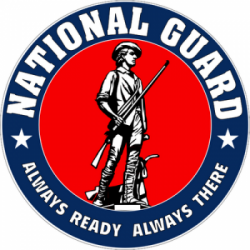 "A strong National Guard comes from a strong and ready active component." General Grass
Comments February 21, 2013
National Guard members nationwide -- especially military technicians -- could be affected by the Defense Department’s furlough without pay of civilian employees that could begin in late April unless Congress overrides a “sequestration” provision in budget law that would mandate deep spending cuts beginning March 1.
Many of the Defense Department’s 800,000 civilian employees perform critical functions such as maintenance, intelligence, logistics, contracting and health care. Officials have expressed concern that furloughs would substantially harm the Defense Department’s ability to reset and restore the force's full-spectrum combat capability after more than a decade of hard fighting in Iraq and Afghanistan.
The unpaid furloughs likely would be one day per week for the last 22 weeks of the fiscal year, from late April through September -- effectively a 20 percent pay cut for Defense Department civilians that would yield an expected $5 billion in spending reduction.
More than half of the National Guard’s full-time members may be furloughed, resulting in maintenance backlogs for all states and curtailment of critical training, especially aviation crew training, that potentially cripples one of the essential 10 capabilities that governors and first responders rely upon in disaster situations, National Guard officials said.
Readiness of nearly 13,000 National Guard soldiers and airmen who mitigate the effects of chemical, biological and nuclear terrorist attacks or industrial accidents in the United States would see exercises and training either delayed or canceled by reductions in operations and maintenance funding, officials said.
The furlough is just one of the potential impacts of a looming sequestration deadline now less than 10 days away, and officials also have expressed concern over the prospect of the government operating under a yearlong continuing resolution in lieu of a budget.
“In the event of sequestration, we will do everything we can to be able to continue to perform our core mission of providing for the security of the United States, but there is no mistaking that the rigid nature of the cuts forced upon this department, and their scale, will result in a serious erosion of readiness across the force,” Defense Secretary Leon E. Panetta said in a message to the Defense Department workforce yesterday.
Army Gen. Frank J. Grass, the chief of the National Guard Bureau and a member of the Joint Chiefs of Staff, has called sequestration potentially “devastating” to the Defense Department and the National Guard.
“The greatest threat the National Guard faces today is continued uncertainty over the budget and the risk of even greater sequestration cuts,” Grass said. “Sequestration would have a devastating impact on our readiness, modernization and workforce.”
The National Guard is the only part of the Army and Air Force in which soldiers and airmen would be directly affected. In addition to civilian furloughs, Army and Air National Guard military technicians could be furloughed, temporary technicians could be terminated, and vacant positions could be frozen.
“We face the potential furlough of civilians and military technicians who provide day-to-day maintenance and training of soldiers and airmen in the states and territories,” Grass said. “One potential readiness impact is a decrease in response time and capabilities to respond to fires, floods and defense support of civil authorities events in the homeland.
“On the Army National Guard side, we face the prospect of a rapid return to year-2000 readiness levels, consistent with a time when the National Guard was postured as a strategic reserve,” Grass continued. “This would be a giant step backward to pre-Sept. 11, 2001, readiness levels at a time of global uncertainty.”
Defense officials also have warned of potential second- and third-order effects and unintended consequences from sequestration.
“The National Guard has installations, wings and armories in more than 3,000 communities in every state and territory and the District of Columbia,” Grass said. “Potential furloughs and cuts will gravely impact local economies.”
Other immediate potential effects on the National Guard include:
-- Decreased equipment and personnel readiness as the 2013 flood, wildfire and hurricane seasons begin. One example: Army leaders have indicated equipment redeployed to the states from the warfight will be returned without depot-level repairs.
-- An almost 80 percent reduction in planned National Guard rotary-wing flying support to Customs and Border Protection for Southwest border security.
-- A halt in flying training hours -- and a corresponding steep decline in readiness -- in the Air National Guard in the next few weeks to sustain essential missions such as aerospace control alert.
-- Reduced maintenance of Army National Guard wheeled and tracked vehicles.
-- Overall decrease in aviation readiness for domestic emergencies.
-- Cancellation of 115,000 medical or dental exams that could render 39 percent of the Army National Guard medically unable to deploy over the coming months.
Longer-term effects anticipated by National Guard leaders include declining retention rates because of decreased training and deployment opportunities, declining equipment, and little or no opportunity for career progression.
“My highest priority is that we in the National Guard leadership do everything in our power to minimize the impact of this on our most important asset, our people,” Grass said.
“A strong National Guard comes from a strong and ready active component,” he added. “We have the opportunity to leverage and maintain this operational reserve and apply it more broadly to serve our national defense strategy. The value of the National Guard is well-documented.”
But regardless of fiscal constraints, Grass said, the National Guard will continue to meet emerging challenges and safeguard the nation and its communities. |







